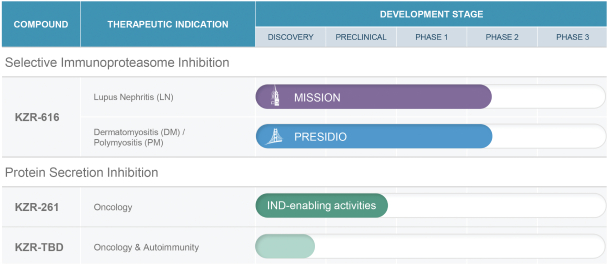SUMMARY
This following summary highlights information about us, this offering and selected information contained elsewhere in or incorporated by reference into this prospectus. This summary is not complete and does not contain all of the information that you should consider before deciding whether to invest in our common stock. For a more complete understanding of our company and this offering, we encourage you to read and consider carefully the more detailed information in this prospectus, including the information incorporated by reference in this prospectus, and the information included in any free writing prospectus that we have authorized for use in connection with this offering, including the information under the heading “Risk Factors” in this prospectus on page 8 and in the documents incorporated by reference into this prospectus.
Unless the context indicates otherwise, references in this prospectus to “Kezar,” “Kezar Life Sciences,” “the Company,” “we,” “us,” “our” and similar references refer to Kezar Life Sciences, Inc. and its wholly owned subsidiaries.
Company Overview
We are a clinical-stage biotechnology company, discovering and developing novel small molecule therapeutics to treat unmet needs in autoimmunity and cancer. Our lead product candidate, KZR-616, a first-in-class selective immunoproteasome inhibitor, has completed testing in healthy volunteers, and we are now leveraging its broad therapeutic potential in Phase 2 clinical trials in severe autoimmune diseases of high unmet need. We have completed enrollment of the final cohort of patients in the Phase 1b portion of the MISSION trial, a Phase 1b/2 clinical trial in systemic lupus erythematosus, also known as lupus or SLE, and lupus nephritis.
We believe that the immunoproteasome is a validated target for the treatment of a wide variety of autoimmune diseases based on its ability to target cells in both the adaptive and innate immune system as bolstered by compelling published activity seen with non-selective proteasome inhibitors administered to patients with severe autoimmune diseases. Based on results from our Phase 1a studies in healthy volunteers and the preliminary results from the Phase 1b portion of the MISSION trial, KZR-616 has largely avoided adverse effects associated with currently marketed non-selective proteasome inhibitors, as exhibited in clinical studies conducted by third parties, including side effects which we believe could prevent them from being utilized as a chronic treatment in autoimmune disorders. We intend to develop KZR-616 to address chronic, severe and underserved autoimmune diseases.
Additionally, we are advancing our novel research platform targeting the Sec61 translocon and the protein secretion pathway to discover and develop small molecule therapeutics targeting oncology indications. Our first clinical candidate in this program, KZR-261, has demonstrated broad anti-tumor activity in preclinical models of both solid and hematologic malignancies. KZR-261 is undergoing laboratory studies and manufacturing activities in support of an investigational new drug, or IND, application, which we anticipate submitting to the FDA in the first quarter of 2021 for a Phase 1 clinical trial in solid tumors. We believe this discovery platform has the potential to yield oral small molecule candidates to act as cytotoxic anti-cancer agents or to block the secretion of novel targets of interest in immuno-oncology or inflammation and that, if successfully developed and approved, could serve as alternatives to currently marketed biologic therapeutics.
KZR-616: Selective Immunoproteasome Inhibitor
We believe that KZR-616 has potential to be developed for the treatment of multiple autoimmune disease indications. In the last decade, research directed by our Chief Scientific Officer, along with work performed in multiple academic laboratories, has led to over 15 peer-reviewed publications showing that selective immunoproteasome inhibition resulted in a broad anti-inflammatory response, reducing autoimmune disease in

